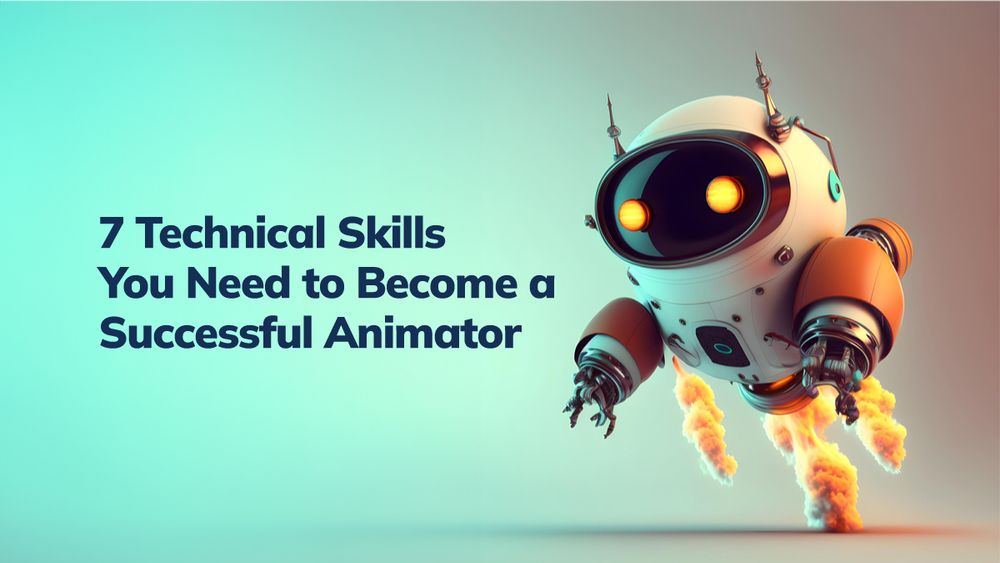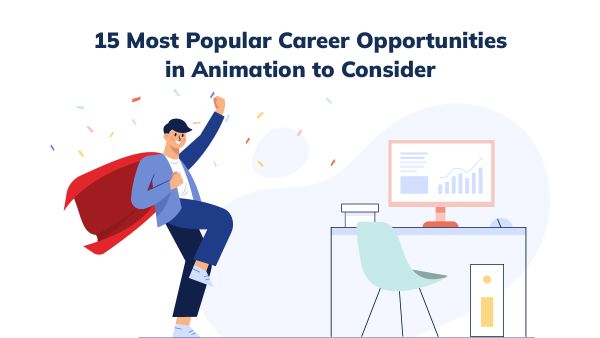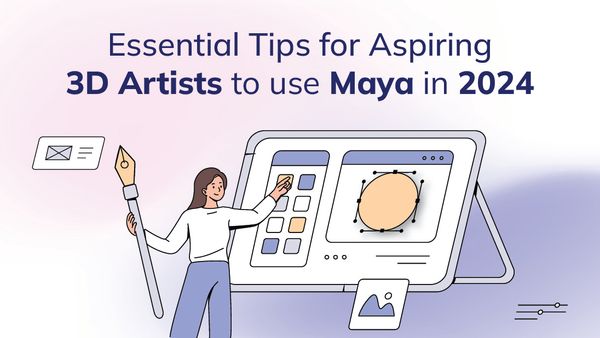7 Technical Skills You Need to Become a Successful Animator
Animation is a fascinating field that allows you to bring characters and stories to life through visual media. The demand for skilled animators proliferates from feature films and television shows to video games and advertising. However, to become a successful animator, you must study animations by enrolling in online animation courses. It takes more than just talent and creativity. This blog will explore the steps you can take to become a successful animator and crack jobs in animation in the media and entertainment industry.
Demand for Jobs in Animation in India
There are a variety of 3d animation jobs opportunities available in the animation industry, ranging from traditional 2D animation to modern 3D and VFX animation. With the growth of the entertainment industry and advancements in technology, the demand for skilled animators has increased significantly. An animator degree is not a must, but if you have it, then it is like icing on the cake. But you must know how to use the maximum range of software in the market to create your imagination into life.
A VFX animation course can prepare you for a career in the VFX industry, which involves creating realistic and immersive visual effects for movies, TV shows, and video games. Meanwhile, 3D animation jobs typically involve creating animations for video games, films, and TV shows using 3D software such as Autodesk Maya or Blender.
Other 3d animation jobs include character animators, motion graphics designers, and storyboard artists. With the proper training and technical skills, animators can find various exciting and fulfilling job opportunities in the animation industry.
What are the Technical Skills needed to become a Successful Animator?
To become a successful animator, you must develop various technical skills related to animation and related software. Here are some of the critical technical skills that you must gather from an animator degree, now you should focus on:
1: Proficiency in Animation Software
Animation software such as Autodesk Maya, Blender, and Adobe After Effects are commonly used in the industry. You should be proficient in at least one of these software programs and familiar with others. It would help if you learned or study animations, the various tools and techniques used for 2D and 3D animation, motion graphics, visual effects, and compositing.
2: Knowledge of Animation Principles
A strong understanding of the principles of animation is essential for creating convincing and compelling animations. These principles include timing, spacing, squash and stretch, anticipation, and follow-through. It would help if you had a solid grasp of these concepts and how they apply to different types of animation.
3: Drawing and Illustration Skills
While drawing and illustration is only sometimes required for animation, having a solid foundation in these areas can be very beneficial. Drawing and illustration skills can help you develop character designs and storyboards and create rough sketches to plan your animations.
4: Knowledge of Rigging and Character Animation
Rigging creates a digital skeleton for a character or object, which can then be animated. Character animation involves creating believable movements and expressions for characters. You must learn how to rig characters and objects and animate them believably and expressively. If you choose VFX animation course, it becomes easier for you to learn better ways.
5: Technical Troubleshooting Skills
While you study animations, you will understand that working with animation software can be complex and challenging, and you will need to be able to troubleshoot technical issues that arise. This can include problems with software crashes, rendering issues, and other technical glitches. You should be able to identify and solve technical issues quickly and efficiently to avoid delays in your workflow.
6: Knowledge of Audio and Video Editing
Audio and video editing skills are also crucial for animators, as you may need to add sound effects, music, or dialogue to your animations. You should be familiar with audio and video editing software and know how to effectively integrate audio and video into your animations.
7: Understanding of File Formats and Compression
You must be familiar with different file formats and compression techniques, as these can affect the quality and speed of your animations. You should know how to export files in the appropriate format and compression level for the intended use, whether for a website, video game, or film.
These are critical technical skills you will learn from the VFX animation course that will help you become a successful animator. It's essential to keep learning and staying up-to-date with the latest software and techniques in the industry to remain competitive and advance your career.
Essential Steps to Attract the Best Jobs in Animation
Develop Your Skills and Knowledge
The first step to becoming a successful animator is to develop your skills and knowledge in the field. This includes learning the principles of animation, such as timing, spacing, squash, and stretch, and mastering the tools and software used in the industry. Take classes or tutorials in animation, drawing, and design, and practice your skills regularly.
Build a Portfolio
Once you have the skills and knowledge, the next step is to build a portfolio that showcases your work. Your portfolio should include a variety of animations that demonstrate your abilities and style. Include personal projects and work you've done for clients or as a team. Your portfolio should be easy to navigate and visually appealing.
Network and Collaborate
Networking and collaboration are essential in any creative field, and animation is no exception. Attend industry events and conferences, and connect with other animators, artists, and designers. Look for opportunities to collaborate on projects, whether with other animators or professionals in other fields, such as game development or advertising.
Seek Out Feedback
Feedback is an essential part of the creative process, and it can help you improve your skills and grow as an animator. Seek out feedback from other animators, professors, or professionals in the industry. Take constructive criticism to heart and use it to improve your work.
Stay Up-to-Date on Industry Trends
The animation industry constantly evolves, with new tools, software, and techniques constantly developed. Stay current on industry trends and new technologies, and continue learning and growing as an animator. Attend workshops or courses to learn new skills and keep your skills current.
Be Persistent and Flexible
Becoming a successful animator takes time and persistence. Don't be discouraged if you face rejection or setbacks along the way. Be open to new opportunities and challenges, and be willing to adapt and evolve as the industry changes.
Work like a Passionate Animator
Passion is critical to becoming a successful animator. If you are passionate about animation, it will show in your work and your dedication to the craft. Keep your passion alive by staying engaged with the industry, taking on new challenges, and learning and growing as an animator.
Develop a Specialization in Animation
While having a broad knowledge of animation principles and techniques is essential, having a specialisation is also helpful. This could be in a particular animation style, such as 2D or 3D, or in a specific area, such as character animation or motion graphics. Specialisation can help you stand out in a crowded field and make marketing yourself to potential clients or employers easier.
It's excellent if You Build Your Brand
In addition to your portfolio, building your brand as an animator is essential. This includes developing a unique style, creating a website or social media presence to showcase your work, and networking with other professionals in the industry. Building a solid brand can help you attract clients or employers and stand out in a competitive field.
Develop Soft Skills
Besides technical skills, successful animators also need solid soft skills like communication, teamwork, and time management. These skills are essential for collaborating, managing projects, and meeting deadlines. Look for opportunities to develop these skills through classes or workshops, and practice them in your work as an animator.
Learn from Others
Learning from others is one of the best ways to learn and grow as an animator. Seek mentors or more experienced animators who can offer guidance and feedback on your work. Collaborate with other animators or participate in online communities where you can share your work and get feedback from others.
Keep a Positive Attitude
It’s essential to maintain a positive attitude as you pursue your career as an animator. This can be challenging and competitive, but staying positive, persistent, and open to new opportunities can help you overcome setbacks and achieve your goals. Celebrate your successes, learn from your failures, and keep pushing yourself to learn and grow as an animator.
In conclusion, becoming a successful animator by getting the best jobs in animation would requires you to study animations to develop skills, knowledge, persistence, and passion. With hard work, dedication, and a commitment to learning and growing, you can build a successful career in animation.




